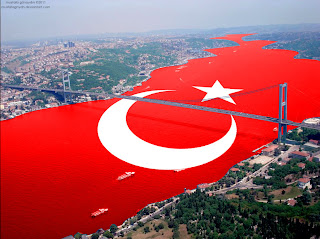 |
| Turkey |
Bond Investing
With interest rates being at all time low and the Federal
Reserve undertaking Operation Twist whereby $40 million of fixed income
securities (MBSs) are purchased indefinitely, investing in the bond market
might not seem too attractive. Bond prices move in opposite direction of
interest rates – so if you’re long the fixed income market you are betting that
interest rates will decrease, hence increasing the value of the bond you
hold. Given the low interest rates
environment, investors should be looking at higher yields in non -US sovereign
debt. Our top- down approach will direct
us where in the world we want to invest. Destination -> Turkey
Quick Facts:
- · Population : 75 million
- · GDP Growth : 8.5% (2010 – 2011)
- · Stock Exchange Growth : 310%
- · Financial Sector Assets (241$ billion in 2006, 710$ billion in 2012)
- · Credit Rating : BB+ (Fitch) Ba1 (Moody’s) BB (Standard and Poors)
As we have previously mentioned in our weekly reviews, we
have been closely watching Turkey’s economy.
Istanbul is slowly becoming an international finance center as the
country’s GDP growth was 8.5% last year – one of the fastest among major
economies. Turkey has a youthful population ( half the population is under the
age of 29) and is relatively politically stable when compared to other emerging
markets. In June 2012, Moody’s Investors
Service upgraded Turkey’s government bond ratings to Ba1 from Ba2 and has
continued to maintain a positive outlook. Turkish banks prove to
be overcapitalized with a capital to risk assets ratio of 16.5% (more than
double of what's legally required).
Turkey’s local-currency bonds have
returned 13 percent this year compared with 9 percent for Russia according to
JPMorgan Chase & Co. indexes. Brazil and Turkey offers investors the
highest yields on their two-year debt among 18 emerging markets tracked by
Bloomberg. Turkey’s record high current account deficit
(imports>exports) shrank to its lowest in 3 years to $1.18 billion from 4$
billion. which reflects lower demand combined with an increase in gold exports. The decrease in imports represents a decrease in consumption which in turn will result in the the government stimulating the economy and lowering rates - the cost of borrowing. Rate cuts of at
least 50 bps are expected in the upcoming weeks. The bank already cut the gap between
its overnight lending and borrowing rate by 150 bps in September and hinted
that it would continue its rate cuts to support growth.
Foreign Direct Investment has also been rising. Turkey’s growth has been noticed particularly by Japan who has substantially raised its investment in Turkish debt. Japanese investors have invested over $3
billion funds in Turkey in 2012. Mizuho Financial Group Inc. and Mistubishi
Corp opened offices this past year.
Sector --> We recommend investing in Turkey’s energy producers. Turkey
is an important energy corridor in Europe connecting East and West. The Turkish Electricity Transmission Company estimates that Turkey’s
demand for electricity will increase at an annual rate of six percent
between 2009 and 2023.
Company --> Aksa Enerji Uretim (AS)
is Turkey’s biggest nongovernment power producer. Aksa has a target of $1.1 billion of
revenue this year. Aksa Enerji has acquired rights to extract an estimated 39
million metric tons of brown coal, or lignite, in the area for 35 years. Also, Goldman
Sachs has a 13% ownership in the company.
Anna Nepravishta



